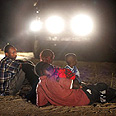
Sudanese refugees wait to cross into Israel from the Sinai
צילום: איי פי
Africa too much for us
Op-ed: Despite merciful Jewish heart, Israel cannot handle waves of African migrants
Let’s call him Dean, and agree that he is strong, has kind eyes, and is 28-years-old or 35 at most. In Sudan or Eritrea he has a woman and two or three children, parents, brothers, and a whole bunch of cousins.
There is no arguing that his life is miserable. He has no way to make a living and no hope. At a moment’s notice he may be sold off to slavery, be thrown into a jail cell at the police station, or see his wife, sister, or one of his daughters beaten up, tortured, or raped.
One day, Dean hears that there is a track that could give him a chance to change his life. Someone advises him to leave everything behind and run off to Israel. The truth is that he doesn’t really know who we are, but very quickly he learns how to do it, who the contact men are, where he needs to reach, and how much this adventure will cost him.
Dean packs a small bag, says goodbye, and embarks on his journey. He may not survive.
The government discussed Sunday the plan to set up an open camp for every Dean, and everyone who follows him. They even earmarked a spot in the Negev. Yet any way you look at this idea, we won’t emerge as bleeding hearts or a light unto the nations through it.
According to reports, some 1,300 miserable souls are trying their luck every month. According to legal definitions, most of them are not refugees. They cannot prove that their lives are threatened at their homelands. These people are mostly poor infiltrators who seek work.
The rumor of a boarding house with warm meals, clothes, health services and even educational programs will merely stimulate and double the immigrant waves.
Who will pay for it?
Negev communities already spoke out, using the harshest words. They mostly see trouble. Indeed, for how long could we keep our Dean in an open camp? After all, he came here to make a living and send money home. What will happen if he becomes ill and requires hospitalization? Who will pay for it? And what do we do with the children? And with the pregnant women?
Moreover, those who decide to set up a camp for infiltrators need to wait for them near the border, prepare absorption plans for the first phase, and think about what will happen once the camp is crowded to capacity.
Indeed, UN institutions are monitoring the heart-breaking stories emerging from Africa, yet they have strict definitions for refugee status. The UN is not prepared and does not intend to come up with solutions for the infiltrators. You built the camp for them, now deal with the consequences, UN officials would tell us.
Nobody would offer to put a few hundred miserable souls on a plane and send them to another country. There is no magic country that waits for African refugees.
Our Dean shall stay at the camp; he won’t be hungry but he’ll grow despaired. Once he becomes bored, he will try to find a job at a community in the vicinity. If he finds one, he’ll bring his friends too. If not, he’ll bring the media. Such story always makes for good photographs, and we’ll end up looking evil and wicked.
So we can’t have a locked-up camp, and an open camp won’t work. And we haven’t yet settled the debt we owe our Palestinian collaborators and South Lebanon Army comrades. And we aren’t yet done taking care of the people who already arrived here from Africa.
So what should we do? Despite the difficulty, and despite our pangs of conscience, and the merciful Jewish heart, and the Holocaust’s trauma – we must not set up an absorption center for infiltrators. The Jewish heart, and especially the one belonging to human right groups, works overtime when it comes to refugees; however, we must take a deep breath and vote against the camp. They want to run away and come here? We’re very sorry, but we’re not at home.
- Follow Ynetnews on Facebook










